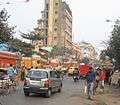Posta, Burrabazar
| Posta | |
|---|---|
| Neighbourhood in Kolkata (Calcutta) | |
|
Part of Posta Rajbari | |
 | |
| Coordinates: 23°48′N 88°15′E / 23.8°N 88.25°ECoordinates: 23°48′N 88°15′E / 23.8°N 88.25°E | |
| Country |
|
| State | West Bengal |
| City | Kolkata |
| KMCWard | 22 |
| Elevation | 36 ft (11 m) |
| Population (2001) | |
| • Total | 42,349 |
| Time zone | IST (UTC+5:30) |
| PIN | 700007 |
| Area code(s) | +91 33 |

Posta (Bengali: পোস্তা) (also known as Posta Bazar) is a neighbourhood in central Kolkata, earlier known as Calcutta, in the Indian state of West Bengal. Once a citadel of Bengali mercantile aristocracy, it is now an extension of the whole sale market in neighbouring Burrabazar, dominated by Marwaris. The wholesale market features a wide range of products such as edible oil, salt, cereals, spices, food grains, sugar, and vanaspati products.[1]
History
The neighbourhood acquired its name from Posta Ghat, a paved stairway in the Hooghly River. The area was earlier occupied by Bengali merchants and bankers, whose riches were legendary. One such merchant was Nuku Dhar, or Lakshmikanta Dhar, who came from Hooghly when it was in decline and settled in Sutanuti. He is believed to have lent the English rulers nine lakh rupees during their campaign against the Marathas. He used to lend money to Robert Clive regularly. It is said that when Nabakrishna Deb approached him for a job, he introduced him to the English and they took him in.[2]
Sukhamay Roy (? - 1811), grandson (daughter’s son) of Nuku Dhar, inherited his maternal grandfather’s wealth because his mother was the only child of Nuku Dhar and he was the only grand child. When the English wanted to bestow on Nuku Dhar the title of ‘Raja’, he requested them to honour his grandson with the title. The request was acceded to and Raja Sukhamay Roy was the founder of the Posta Raj family followed by Sri Bishnu Prosad roy,Sri Pashupatinath Roy Sri Jitendra Nath Roy, Sri Samir Roy, Sri Pronab Kumar roy, Sri Prodyut Kumar roy, Sri Dilip Kumar Roy, Sri Amit Kumar Roy, Sri Kaushik Roy, Sri Arnab Roy, Sri Priyojit Roy, Sri Abhishek Roy, Sri Riddhiman Roy, Sri Kuntal Roy. City development and road construction has eaten away some parts of his old palace. Now, three houses exist: Lalbari, Rajbari and Thakurbari.[2]
The Posta Raj family had once constructed the road from Cuttack to Puri, in order that pilgrims could travel easily to the Jagannath temple. According to some, the road to Puri was built, with Sukahmoy Roy's financial support, from Uluberia. He contributed extensively to community development and social welfare activities. He was a director of the Bank of Bengal and was dewan of Sir Elijah Impey. He was subsequently honoured with the title of 'Maharaja'. At the time when Posta was developed by the Posta Raj family, people were afraid of settling beyond Jorasanko, on the banks of the Hooghly River. Even moving around in the area during day time was restricted because of the terror struck by Mugh pirates, thieves and dacoits. Posta Raj family dared to shift to the area because they had the strength and the manpower to withstand assaults.[2][3]
Economics
Wholesale market
The neighbourhood was earlier called Amposta as it was a wholesale market for mangoes. It is no more so. Parts of the neighbourhood are called Aluposta, wholesale market for potatoes, and Dalposta, wholesale market for lentils.[2]
West Bengal Government had earlier planned to shift the Posta-Burrabazar wholesale markets to Kona but majority of the traders resisted the move citing lack of infrastructure there. In the Vision 2025, the 20-year perspective for the overall development of Kolkata Metropolitan Area, the proposal is to shift the wholesale market to New Town, because it has adequate infrastructure.[4]
Administration
Posta being in the business district, the police station[5] has a tough time with the abundant criminals.[6]
Culture
Sukumar Ray, Bengali humorous poet, has mentioned the neighbourhood in his collection of non-sense rhymes, Aboltabol, through which children in Bengal get acquainted with it. His lines are:
suntey pelam Posta giye,
tomar naki meyer biye…
Heard your daughter's getting married,
From Posta, the news I carried.[7]
Images
 Gate of the "Kali Krishna Tagore House" on Darpanarayan Tagore Street
Gate of the "Kali Krishna Tagore House" on Darpanarayan Tagore Street Transport line up for movement of goods
Transport line up for movement of goods A busy road passing through the neighbourhood
A busy road passing through the neighbourhood Bust of Sardar Vallabhbhai Patel in the neighbourhood
Bust of Sardar Vallabhbhai Patel in the neighbourhood
References
- ↑ "Posta Market". india9.com. Retrieved 2008-01-18.
- 1 2 3 4 Bandopadhyay, Debashis, Bonedi Kolkatar Gharbari, (Bengali), Second impression 2002, pp. 49-51, Ananda Publishers, ISBN 81-7756-158-8
- ↑ Sengupta, Subodh Chandra and Bose, Anjali (editors), 1976/1998, Sansad Bangali Charitabhidhan (Biographical dictionary) Vol I, (Bengali), p. 575, ISBN 81-85626-65-0
- ↑ "Posta shift part of city growth vision". The Telegraph, 11 January 2006. Retrieved 2008-01-18.
- ↑ "Posta Police Station". Kolkata Police. Retrieved 2008-01-16.
- ↑ Banerjee, Soumyabrata (2004-03-20). "Migrant gangs keep cops on toes". Times of India, 20 March 2004. Retrieved 2008-01-18.
- ↑ Ghosh, Ruchira. "The Suitable Groom". geocities.com. Archived from the original on 2009-10-23. Retrieved 2008-01-18.
